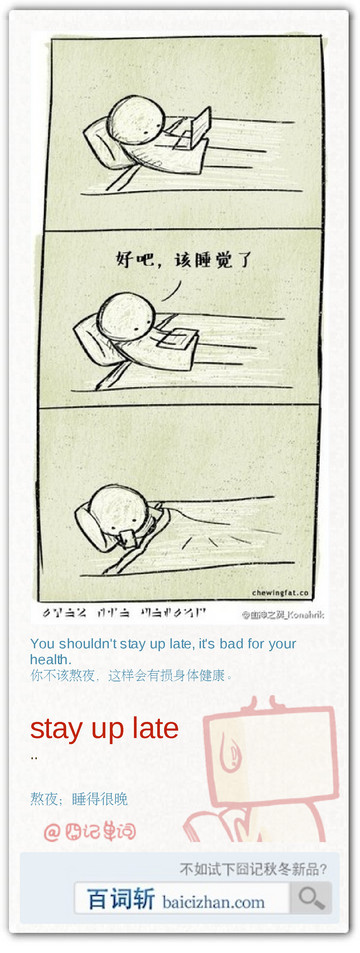|
-
— 本帖被 微青。 从 English Corner 移动到本区(2013-09-06) —请在原帖跟帖就好!!!祝大家新年快乐!!![ 此帖被北衍柘在2013-02-12 18:23重新编辑 ]
- 鱼尺素。2012-08-20+33 派派币
- 斑竹鱼尺素。评分
- 倒序阅读 只看楼主
-
Re:【英语角||爱上记单词】每周七单词,快乐大放送——第61··周(2.4-2.17
Week 61 Word 01
acquaint [ə'kwent] vt. (with)使了解;介绍,使熟悉
这个名人崇拜的现象啊……我想说在莫言得诺贝尔文学奖之前,有几个人能认识他?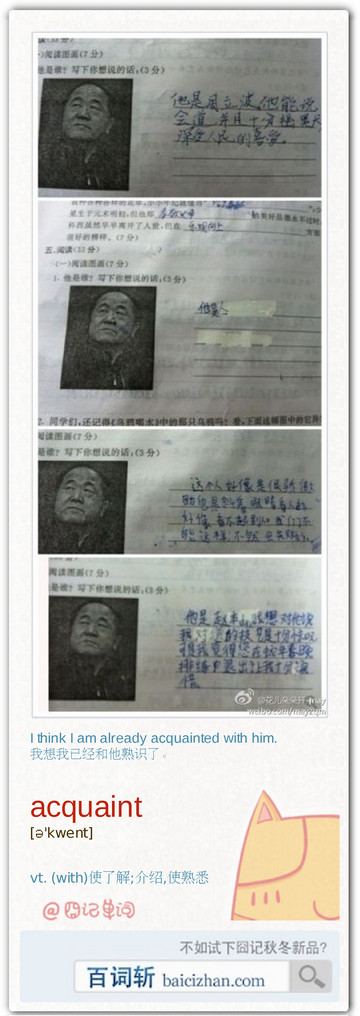
acquaint
VERB 动词See also: acquainted; 使认识;介绍;使了解 If you acquaint someone with something, you tell them about it so that they know it. If you acquaint yourself with something, you learn about it.
例:I want to acquaint myself with your strengths and weaknesses.
我想知道你有哪些长处以及不足。
例: Acquaint him with your plans.
把你的计划告知他。[ 此帖被左。小猫在2013-02-04 21:50重新编辑 ] -
Re:【英语角||爱上记单词】每周七单词,快乐大放送——第61··周(2.4-2.17
Week 61 Word 02
sealed [sild] adj. 密封的;未知的 v. 封闭;盖印
好久没有看tbbt,penny怎么变这么胖了啊?
sealed
V seal的过去分词the past participle of seal
例: We will never forget the friendship sealed in adversity.
患难之交永不忘。
2.ADJ(of a road) having a hard surface; made-up (路面)硬的[AUSTRALIAN]
例: She sealed the letter.
她把信封上了。[ 此帖被左。小猫在2013-02-04 21:57重新编辑 ] -
Re:【英语角||爱上记单词】每周七单词,快乐大放送——第61··周(2.4-2.17
Week 61 Word 03
gentleman ['dʒɛntlmən] n.绅士;有教养的人
这绝对是毁小清新啊喂……神马“第三个愿望是要更多愿望的”简直就弱爆了啊喂……
gentleman
N-COUNT 可数名词有身份的人;绅士 A gentleman is a man who comes from a family of high social standing.
例: ...this wonderful portrait of English gentleman Joseph Greenway.
英国绅士约瑟夫·格林韦的精美画像
2.PHRASE 短语(口头的)君子协定,绅士协定 A gentleman's agreement or a gentlemen's agreement is an informal agreement in which people trust one another to do what they have promised. The agreement is not written down and does not have any legal force.
例: She made a gentleman's agreement with her buyer.
她和买主立了个君子协定。
本文来自派派小说论坛 :http://m.paipai.fm/r6610941_u18284521/[ 此帖被左。小猫在2013-02-04 22:04重新编辑 ] -
Re:【英语角||爱上记单词】每周七单词,快乐大放送——第61··周(2.4-2.17
Week 62 Word 04
giant ['dʒaɪənt] n.巨人;巨物 adj.巨大的
这位仁兄,你确定你是去考试而不是去申请神马“吉尼斯纪录”的么……拿着这么大的一只铅笔很招风么啊喂……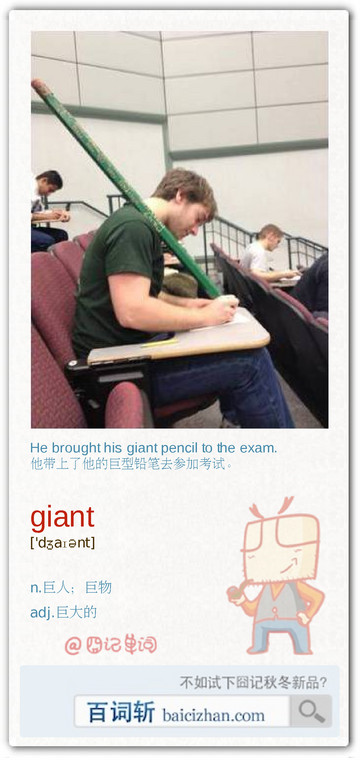
giant
1. ADJ 形容词巨大的;特大的;极其重要的 Something that is described as giant is much larger or more important than most others of its kind.
例: ...a giant oak table.
巨大的橡木桌
2.N-COUNT 可数名词大公司;大企业;大国 Giant is often used to refer to any large, successful business organization or country.
例: ...one of Germany's industrial giants, Daimler-Benz.
德国工业巨头之一,戴姆勒—奔驰公司。[ 此帖被左。小猫在2013-02-04 22:11重新编辑 ] -
Week 62 Word 06
rage [reidʒ] n. 狂怒, 强烈的欲望, 狂热; 狂暴, 肆虐; 风靡一时的事物 v. 发怒, 怒斥; 流行, 盛行; 猖獗, 激烈
现实中担惊受怕处处受气,到网络上便化身猛兽四处发泄。你可曾这样?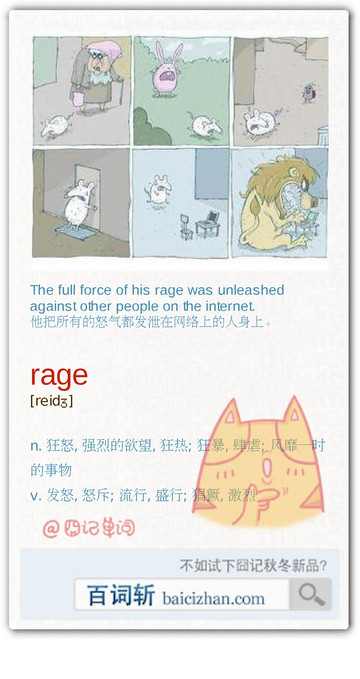
rage
1. N-VAR 可变名词狂怒;盛怒 Rage is strong anger that is difficult to control.
例:He was red-cheeked with rage...
他气得满脸通红。
2.VERB 动词肆虐;猖獗 You say that something powerful or unpleasant rages when it continues with great force or violence.
例: Train services were halted as the fire raged for more than four hours...
火灾肆虐超过4个小时,期间列车停止了运行。[ 此帖被左。小猫在2013-02-04 22:33重新编辑 ] -
Week 62 Word 07
camouflage ['kæmə.flɑːʒ] n. 伪装;掩饰; v.使改头换面,伪装,掩饰;欺瞒
“糟糕!被发现了!”
camouflage
1.N-UNCOUNT 不可数名词(军事上的)伪装,隐蔽 Camouflage consists of things such as leaves, branches, or brown and green paint, which are used to make it difficult for an enemy to see military forces and equipment.
例:They were dressed in camouflage and carried automatic rifles.
他们身着迷彩服,手持自动步熗。
2.VERB 动词对(军事建筑或车辆)进行伪装;掩饰 If military buildings or vehicles are camouflaged, things such as leaves, branches, or brown and green paint are used to make it difficult for an enemy to see them.
例: You won't see them from the air. They'd be very well camouflaged...
你从空中是看不见它们的,它们会被精心伪装起来。[ 此帖被左。小猫在2013-02-04 22:37重新编辑 ] -
Week 62 Word 08
review [ri’vju:] vt.再检查 n.复习
面对着整本书的重点时,有时候真的是森森的无奈啊喂……
review
N-COUNT 可数名词检查;审查;审核 A review of a situation or system is its formal examination by people in authority. This is usually done in order to see whether it can be improved or corrected.
例:The president ordered a review of US economic aid to Jordan...
总统下令对美国向约旦提供的经济援助进行审查。
2. VERB 动词仔细研究;审视;细查;详查 If you review a situation or system, you consider it carefully to see what is wrong with it or how it could be improved.
例: The Prime Minister reviewed the situation with his Cabinet yesterday...
昨天,首相和他的内阁对局势进行了审度。[ 此帖被左。小猫在2013-02-04 22:42重新编辑 ] -
Week 62 Word 09
reality [ri’æliti] n.现实;真实
当这一切都是梦境的时候,我只有满脸的血……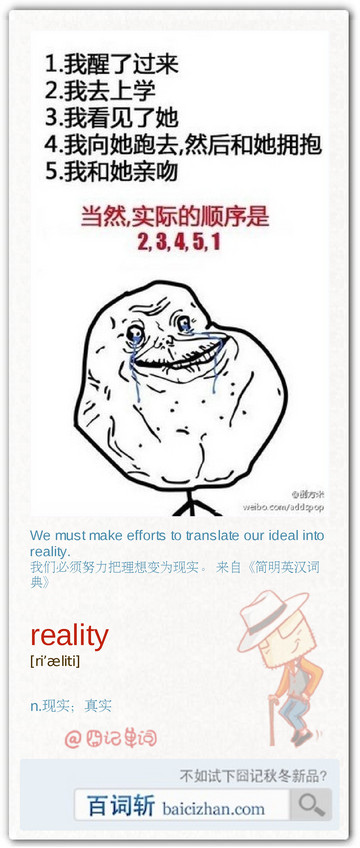
reality
1. N-UNCOUNT 不可数名词See also: virtual reality; 现实;事实 You use reality to refer to real things or the real nature of things rather than imagined, invented, or theoretical ideas.
例:Fiction and reality were increasingly blurred...
虚构和现实越来越难以区分了。
2. PHRASE 短语事实上;实际上 You can use in reality to introduce a statement about the real nature of something, when it contrasts with something incorrect that has just been described.
例: He came across as streetwise, but in reality he was not.
他给人的印象是很适应都市生活,但实际上并非如此。[ 此帖被左。小猫在2013-02-04 22:46重新编辑 ] -
Week 62 Word 10
indirect [indi’rekt] a.间接的;不坦率的
麦当当的巧妙广告设计,赞!虽然我很不CJ了一回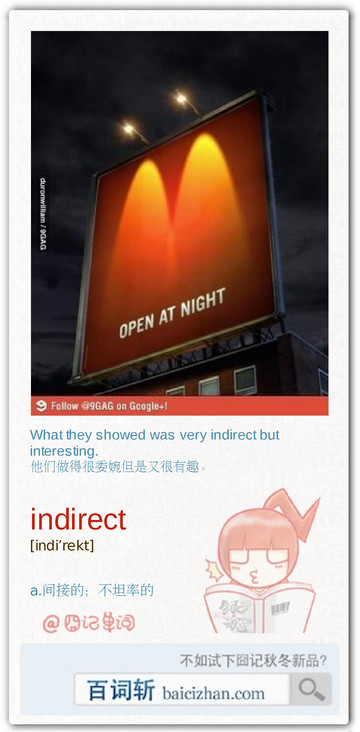
indirect
1. ADJ 形容词间接的;非直接的 An indirect result or effect is not caused immediately and obviously by a thing or person, but happens because of something else that they have done.
例:Millions could die of hunger as an indirect result of the war...
作为战争的间接后果,数百万人可能会死于饥饿。
例: The goods went by a rather indirect route.
这些货物运输时走了一条非常迂回的路线。[ 此帖被左。小猫在2013-02-04 22:51重新编辑 ]

